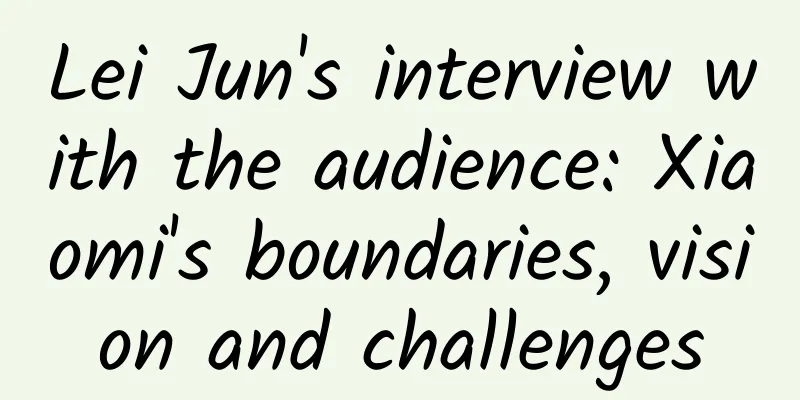Lei Jun's interview with the audience: Xiaomi's boundaries, vision and challenges

|
December 17 was the day after Lei Jun’s 45th birthday. That morning, he chatted with more than a dozen media outlets in the Xiaomi office for three hours. Starting with the Xiaomi ecosystem, he answered dozens of questions without interruption - why invest in Midea instead of Haier? What is the truth about the Xiaomi ecosystem? Why invest in 100 hardware companies? Is Xiaomi really a bully in the hardware industry? Is the Xiaomi model replicable? Does Xiaomi really have enough money? Will it go public? And so on, Lei Jun gave candid and in-depth answers. During the interview, Lei Jun repeatedly emphasized that Xiaomi's ecosystem is open and non-exclusive. It is a huge misunderstanding that everyone thinks "Xiaomi does everything". Xiaomi's core principle is to restrain greed and be focused. Xiaomi has boundaries. Lei Jun said that on his 40th birthday, he put aside the past and founded Xiaomi. On his 45th birthday, he received two big gifts, one was 360's investment in Coolpad, and the other was Huawei's release of Honor 6 Plus. "The competition in this industry is terrifying." What path should Xiaomi take? Lei Jun said that a friend gave him a sentence last year that taught him a lot: stick to the original path. For an unlisted company, profits are not important, increase investment, and don't be manipulated by the market. ----The following is the essence of the conversation--- Why does Xiaomi want to build an ecosystem? The smart home wave was started when Google acquired Nest in January 2014, which reminded us all to speed up. Before we started making Xiaomi smartphones, we hesitated whether to make smartphones or routers first. We now have three core products: smartphones, TVs, and routers. The strategies for these three products are all based on the ecological chain. The equipment and products we invest in are highly related to the ecological chain. Ecological chain competition may not have much effect in the short term, but it will be seen in 3-5 years. The transformation of the ecological chain has just begun. Mobile phones are platform-based hardware products that are highly dependent on the growth of the ecological chain. Hardware competition has always been multi-dimensional. It is not about selling more or less phones, but competition across the entire ecological chain. This is the basis of everything. Back to the topic, why did Xiaomi start with hardware when building its ecosystem? The reason is that under the existing BAT structure, only this model can make a breakthrough. In the competition, we are cautious and look for different entry points from BAT. At the same time, our pursuit of profit is very flexible (for example, we cooperated with Baidu to invest in iQiyi), and we are not fighting for every inch of land. Only in this way can Xiaomi become a billion-dollar company and the world's number one. Otherwise, how much value do you have if you build one billion-dollar company after another? It is worthless to copy yourself again and again. What does the Xiaomi ecosystem include? We established Xiaomi's ecological chain department last year, with the plan to invest in 100 hardware companies, and of course the number may be far more than that in the future. The core of Xiaomi's ecosystem is Xiaomi mobile phones, and the surrounding areas are the ecological chain companies invested by Xiaomi, and the surrounding areas are the companies that Xiaomi has allied with and invested in. Ecosystem enterprises also include three layers: the first layer is the smart hardware ecosystem; the second layer is the content industry ecosystem; and the third layer is cloud services. (In the hardware ecosystem, we invested in hardware startups; in the content ecosystem, we invited Chen Tong to invest in Youku and iQiyi; in cloud services, we invested in Kingsoft and 21Vianet) Xiaomi has invested in so many startups, mature companies and even listed companies. What are the boundaries of Xiaomi? First of all, Xiaomi has boundaries. Xiaomi focuses on only three types of products: mobile phones (including tablets), routers (including boxes), and TVs. The purpose of our ecological chain investment is not to make more products, but to focus. It is very chaotic and dangerous for all product lines to advance at the same time. Now we are clearly moving forward at the right pace. Our keywords today are restraint, focus, and steady progress. In the past, when we were internationalizing, we were working on six or seven regions at the same time. Now we are focusing on making breakthroughs in India. As for Internet finance, our idea is to do it after preparation. Xiaomi has three core principles: 1. Restrain greed, do less, and do core things well; 2. Form alliances as widely as possible and collaborate with everyone; 3. Drive the transformation and upgrading of the entire industry through the ecological chain. When I was an angel investor, Sequoia Capital's Shen Nanpeng gave me some advice, saying "You are too conservative and will miss a lot". But as a VC, it doesn't matter if you lose a hundred cases, as long as one is successful, that's enough. The world doesn't look at how many you lose, but how many you win. So I said, relax, to put it bluntly, Xiaomi will help the 100 companies I invested in, but life and death is the CEO's own business, I still eat and sleep, it doesn't matter. I believe there will always be a few successful ones, and there will always be more than 10 billion US dollars. Shunwei Capital once reviewed 7,000 cases and concluded that as long as they hit a home run, they would win back everything. As long as one case succeeded, it didn’t matter if all the others failed. Xiaomi's three networks: Xiaomi has several networks. The first is that Xiaomi is not only a mobile phone company, but also a mobile Internet company, so our first platform is the mobile Internet platform. For example, in November alone, Xiaomi's game business turnover was RMB 173 million, which is very impressive; the second platform is the e-commerce platform. Whether in terms of turnover or scale, especially in smart hardware, it can be ranked among the top three in the country. One of the reasons why we attach so much importance to the smart hardware industry chain is to supplement Xiaomi's product line; the third platform is cloud services. In cloud services, Xiaomi also has a three-tier strategy. Currently, the cloud services provided by Xiaomi itself are concentrated on the application side. The middle layer is Kingsoft, which mainly focuses on data mining and utilization. The infrastructure (computer room, etc.) is provided by 21Vianet. The two parties work together in a division of labor and do not restrict each other. They have independent business strategies. Why did you finally choose Midea? We started preparing routers at the beginning of last year. We designed the routers as home servers and home storage centers. While making routers, we also started to build an ecosystem for smart hardware. In the early stages, we wanted to find large companies to cooperate with. At the beginning of the year, we were communicating with home appliance giants. Finally, it took us eight or nine months to reach a strategic partnership with Midea. We welcome companies like Haier, Hisense, and even Gree to cooperate with us. However, for these traditional large enterprises, it is difficult to really start cooperation without successful cases, so Midea is a starting point. Investing in Midea is an extension of the smart home strategy we developed two years ago. Our first step is to invest in the smart hardware industry chain to make our industry chain take shape, so that we can convince Midea to cooperate with us. The second step is to invest in Midea. Through the partnership with Midea, we want to achieve the interconnection between Xiaomi devices and Midea devices. We want to connect all devices with Xiaomi within five years. Evaluating Dong Mingzhu You can't be so willful when running a business. Strategy has nothing to do with betting. We also want to cooperate with Gree. (Laughs) There are now terms like "Xiaomi faction" and "Lei Jun faction". Is this a kind of standing in line? You have been talking about openness. Are the two contradictory? Xiaomi's fundamental principle is to be non-exclusive, non-partisan, and open. We do not require the companies we ally with or invest in to take sides. Openness is the foundation for building an ecological chain. For example, in the ecological chain of the content industry, we have invested in Youku and iQiyi, which are the best video websites and direct competitors. We do not participate in the competition in the content industry, but only seek cooperation between the content industry and us. For example, we chose Kingsoft Cloud as the cloud provider, but we may also choose Amazon (Amazon also supports part of Xiaomi's cloud storage). Kingsoft Cloud is not Xiaomi's only supplier, but a major supplier. The premise of our cooperation is not whether we invest or not. Investment is only to implement Xiaomi's strategy and its purpose is to strengthen ourselves. The core purpose of Xiaomi's investment in 100 hardware companies is to enhance the competitiveness of Xiaomi mobile phones Xiaomi is definitely not an investment company. I don’t care which of these 100 companies can succeed and which cannot. Xiaomi’s attitude is that whether you make a profit or not is your business. The only truth is that building an ecological chain is to enhance the competitiveness of Xiaomi mobile phones. The success or failure of the ecological chain is their own business. We just play the role of shareholders. The biggest benefit we can get is that they support our strategy. What I always care about is, first, whether the companies we invest in are in line with Xiaomi’s strategy and help Xiaomi enhance its competitiveness; second, whether they do not lose money. These 100 companies can serve as a model and drive the entire industry chain. We will then invite more partners to join us, but we have our own selection criteria. The core of the criteria is to be consistent with Xiaomi's values and Xiaomi's user base, which has nothing to do with the price of the product itself. For example, Nest products are good and expensive, but they do not meet the mainstream needs of Xiaomi's user base, so we will not introduce Nest products. Currently, there are many excellent and suitable products on sale on Xiaomi.com, but we do not aim to build a large comprehensive platform like Tmall and JD.com. We are not currently prepared to introduce more devices (for sale on Xiaomi.com). Two-year protection period For the companies we invest in, Xiaomi has a two-year protection period, ensuring that we only invest in one company of the same type and in the same field. But after two years, we will invest in other companies, for sure. What are the differences in Xiaomi resources enjoyed by Xiaomi-affiliated and non-Xiaomi-affiliated companies? The amount of resources enjoyed has nothing to do with whether or not to invest. The higher the support for our strategy, the more we support it. Xiaomi is formulating a set of guidelines to classify products and allocate different cooperation and resource plans according to the level. However, the specific details have not yet been released. Do you think hardware startups like you? This is a very controversial issue. We have invested in many companies, but those companies that cannot get our investment scold us. However, Xiaomi is open and we welcome you to invest in us and connect with us. Xiaomi doesn’t want to become an incubator Xiaomi does not want to become an incubator. Air purifiers are a very special example. In order to ensure that the invested companies have operational capabilities, we will input more supply chain capabilities to the invested partners, help them connect with manufacturers, and endorse them with Xiaomi's reputation. But the premise is that all the products in the industrial chain using the Xiaomi brand must be approved by me. The reason why Xiaomi can win is high efficiency The examples of Tong Ren Tang, Walmart and Costco were cited (1,000 words omitted here, you can refer to Lei Jun’s internal speech at Lenovo, which mentioned that Fu Sheng bought two Samsonite at Costco at a very low price to attract Lei Jun to apply for a Costco card) to prove that the essence of business is high efficiency, and behind cheapness is high efficiency, and high efficiency is the absolute reason for Xiaomi’s victory. How did Xiaomi do it? The first is real materials, high performance, and high experience. The key word is to exceed user expectations. The second is e-commerce direct sales, high-efficiency operation, and obvious advantages. Our operating efficiency is absolutely at the world's leading level. The second is word of mouth, which generates super high reputation and can save a lot of advertising and marketing costs. If the first one is not done well, ten or a hundred times the experience will make up for the first one (real materials). Xiaomi cannot be copied, but the Xiaomi model can be copied It is difficult to copy a Xiaomi, but the Xiaomi model is replicable and can be promoted. Our goal is to help 100 traditional companies transform. When doing things in traditional industries, the most important thing to consider is cost, but we invest a lot in product development. We price close to cost, and we hope that our peers will learn from us. Three major challenges ahead There are many challenges. First of all, the smartphone industry has many problems and is now at a technical bottleneck. For example, electronic and battery technology is the slowest in the entire consumer electronics industry. Not only do we need to solve technological innovation problems, but we also need to solve reliability and mass production problems. It is not easy. I threw away 400,000 units of the first generation of Redmi in the first half of last year. We had already placed an order, but because they did not meet the standards, we threw them all away. There will be more such things. We rely on huge workloads to control risks. Xiaomi usually prepares several plans, but only one of them is finally launched on the market. This will of course bring huge waste, but this waste is necessary. In addition, the patent challenge, the patent war is Xiaomi's coming-of-age ceremony. How to celebrate this coming-of-age ceremony? Xiaomi plans to obtain 1,300 patents next year, including 300 international invention patents. The key now is that time is too short. What we need most is time. We have to turn our invention ideas into patents to have a ticket in this round of competition. 5-10 years, patent wars are part of the rules of the game. Apart from patents, the biggest challenge is privacy. Xiaomi's goal is to become the company with the most comprehensive user privacy protection in the world. We are about to launch a Xiaomi Privacy White Paper. There is no reason to hate Xiaomi I agree with what Wang Xing said recently: No matter what industry you are in, if you think your industry has nothing to do with the Internet, in a year or two, this industry will have nothing to do with you. It is unreasonable for everyone to hate Xiaomi now. The wave of mobile Internet and smart home has come. If you don’t change, you will die. Xiaomi has no walls, but Xiaomi has fences In the IBM era, it was an open ecosystem, but in the Apple era, it became closed again. Xiaomi is different. We are an intermediate model. IBM basically does not care and lets the market run freely, so there are good and bad companies. But Xiaomi has management intelligence. We select and manage the market, products, and partners. Xiaomi does not have walls, but it has fences. What will the future smart hardware market look like? There are two directions for smart hardware in the future: one is the popular and cheap mass-market products, and the other is the personalized products with premium prices. This is the reality. Either you use the Xiaomi model, or you are out of alignment with this model. But industrial products cannot be the only oligopoly market, and non-Xiaomi companies can certainly succeed. With so much investment, Xiaomi is not short of money Xiaomi did something this year that was not necessarily worse than an IPO, which was to issue a $1 billion bond. Many big banks participated, and the demand for these banks to participate was far more than $1 billion. Our principle is to reserve food in good years, and we issue bonds on the premise of having abundant cash. Kingsoft almost closed down before, and I know that for a company to survive, it must first ensure a high cash reserve. We invested in Xunlei, iQiyi, 21Vianet and other companies this year, spending more than a billion, but it is far above the safety line. Kingsoft Software alone has 1.2 billion in cash, Xunlei has 500 million in cash, and we also have Shunwei. Xiaomi is not an isolated individual, but a whole system. We use a lot of financial leverage in each investment. Xiaomi is not short of money. No IPO plans within five years We are now the controlling shareholder of four listed companies (Kingsoft, Cheetah, Xunlei, and YY). There are many short-term investors in listed companies, which distorts long-term goals. Therefore, we do not have any IPO plans in the next five years. We have also made a goal of not pursuing short-term profits, but we have invested heavily in talent, technology, and R&D, and will also invest heavily in logistics centers and service centers. Ten years later, Xiaomi changed China Xiaomi is positioned as a national enterprise. What we are doing is to promote this round of industrial revolution. The first sign of changing the industrial society is to make all products high-quality and low-priced. We have spent three years changing the smartphone industry, and all products have become better and cheaper. In ten years, you will see that Xiaomi has changed China, at least the industry. We also want to become the world's number one and let the world enjoy the fun of China's technological innovation. Domestic companies need to unite more, raise their guns a little higher and aim them at foreign companies instead of always targeting Xiaomi. As a winner of Toutiao's Qingyun Plan and Baijiahao's Bai+ Plan, the 2019 Baidu Digital Author of the Year, the Baijiahao's Most Popular Author in the Technology Field, the 2019 Sogou Technology and Culture Author, and the 2021 Baijiahao Quarterly Influential Creator, he has won many awards, including the 2013 Sohu Best Industry Media Person, the 2015 China New Media Entrepreneurship Competition Beijing Third Place, the 2015 Guangmang Experience Award, the 2015 China New Media Entrepreneurship Competition Finals Third Place, and the 2018 Baidu Dynamic Annual Powerful Celebrity. |
<<: Baidu invested in Uber, Li Yanhong's intention is not "taking a taxi"
>>: How do big WeChat self-media accounts make money?
Recommend
Long-term reasons and short-term investments
Analyzing my own investment experience, I often m...
How to develop a React Native app for both Android and iOS
As we all know, React Native can be used to devel...
How to apply for a Beijing residence permit in 2022? How to apply online? How many days can it be completed soonest?
In the Civil Code implemented in 2021, a new righ...
China Industrial Technology Software Industry Alliance: 2020 Industrial Internet APP Development White Paper
A preliminary analysis was conducted on the overa...
The points system has raised questions about the high energy consumption of new energy vehicles, and the pure electric route may be revised
After the introduction period and entering the gr...
ELISA《YouTube Operation and Promotion Practical Skills》How to play YOUTUBE in the eyes of foreigners
Training course content: How to use YouTube in th...
The "Tianhui Medical Book" that reappeared more than 2,000 years ago turned out to be the lost medical book of Bian Que?
Recently, the Tianhui Medical Bamboo Slips, a Han...
How to find the right brand marketing method?
In life, we often see the success of others and t...
CES Observation: Female users become the new favorite of smart hardware industry
Recently, CES 2016 closed successfully under the ...
4 issues that determine the success or failure of Google Play in China
[[154198]] Google's return to China has taken...
How to start live streaming sales for brands? Brand self-broadcasting full process design
This article is divided into three parts: 1. Full...
Apple's Safari browser is already 13 years old!
In 2003, Apple released Safari, the "fastest...
Dedicated to young people who love sports, the new generation of Focus may be launched this year
In 2018, the last batch of post-90s generation ha...
Cycloglossum: The happiness of the “richest animal” is beyond your imagination!
Produced by: Science Popularization China Author:...









